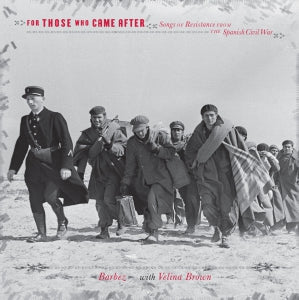Barbez - For Those Who Came After: Songs of Resistance From the Spanish Civil War - LP/CD
Barbez - For Those Who Came After: Songs of Resistance From the Spanish Civil War - LP/CD
Couldn't load pickup availability
Share
Eighty years ago, the "alt-right" proudly called themselves by a different name: fascists. The first war they launched was in July 1936, when right-wing Spanish military generals attempted to overthrow the democratically elected, left-leaning government of the Spanish Republic. The coup initially failed, but the generals, aided by Adolph Hitler and Benito Mussolini, transformed their effort into the bloody three-year long Spanish Civil War, a dress rehearsal for World War II. Though the Republic ultimately lost the war, its defenders organized a response that will endure forever as a testament to solidarity: the creation of the International Brigades, tens of thousands of volunteers, from more than fifty countries, who journeyed to Spain to fight fascism. These included 2,800 Americans who came to be called the Abraham Lincoln Brigade.
On October 20th, sui generis Brooklyn-based band Barbez, in collaboration with singer Velina Brown, release a remarkable tribute to those volunteers called For Those Who Came After: Songs of Resistance from the Spanish Civil War. These inventive and moving new renderings of the indelible protest songs of the International Brigades will be released on the pioneering Boston-based label Important Records. The album was recorded live at the Japan Society, in 2016, at the annual reunion of veterans of the Abraham Lincoln Brigade, an event that has been held in New York since the 1940s. The highlight of the reunion has always been the singing of these songs, which were led on several occasions by Pete Seeger, a lifelong friend of the Lincoln veterans, who recorded many of them for his iconic 1944 album, Songs of the Lincoln Battalion.
Barbez draws on avant-rock, contemporary classical and folk music styles such as cumbia and flamenco to reinvent iconic songs like "L'Internationale" (The International) and "Viva la Quince Brigada" (Long Live the Fifteenth Brigade) for a new generation of listeners. The album features the group's stellar musicians: clarinetist Peter Hess (Philip Glass Ensemble), theremin virtuoso Pamelia Stickney (David Byrne), marimba and vibraphone player Danny Tunick (the Clean), guitarist Dan Kaufman (Rebecca Moore), violinist Catherine McRae (the Quavers), bassist Peter Lettre (Shearwater), and drummer John Bollinger (Sway Machinery); with vocalist Velina Brown (San Francisco Mime Troupe) and special guests Dafna Naphtali on background vocals and Sebastiaan Faber on trumpet. It's the first Barbez record since 2013s acclaimed Bella Ciao (Tzadik), which was inspired by ancient Roman Jewish melodies and the Italian Resistance during World War II. Like each of the group's previous five albums, For Those Who Came After was mixed by the incomparable Martin Bisi (Swans, Sonic Youth, John Zorn) at his legendary B.C. Studio in Gowanus, Brooklyn. Live engineering was performed by Damon Whittemore (Paul McCartney, Andrew Bird). Released on vinyl and CD, the album also features extensive liner notes by award-winning author Adam Hochschild, who recently published a groundbreaking history of the Spanish Civil War.
Dan Kaufman, the bandleader of Barbez, moonlights as a journalist. He has written extensively on the Spanish Civil War for The New York Times, The Nation, and The New York Observer. Over the course of that reporting he got to know many veterans of the Lincoln Brigade, including the last surviving one, Del Berg, who died at 100 last year. Included on the record's final cut, "A las Barricadas," is a fragment of an interview Kaufman conducted with Berg at Berg's California mountain home the year before he died. "Viva la Quince Brigade," the record's first track and the Brigade's unofficial anthem, features a fragment of an interview with Abe Osheroff, a legendary Lincoln vet and lifelong activist who built a community center in Mississippi during the civil rights era and helped organize a shipment of ambulances to Nicaragua two decades later. Osheroff's interview was conducted by the Abraham Lincoln Brigade Archives (ALBA), a non-profit dedicated to preserving and teaching the legacy of the Lincoln Brigade. ALBA has generously supported this project and all proceeds from it go to the organization's educational and human rights programs.
In October 1938, the International Brigades were sent home. Five months later, Madrid, the Republic's last holdout, fell. Some half million Spanish Republican exiles fled by foot across the border, settling for a time in damp, primitive internment camps on the beaches of southern France. Their plight–and defiance–are captured in the image on this album's cover, which was taken by the renowned war photographer Robert Capa in April 1939. During World War II, thousands of Spanish exiles joined the French Resistance and many International Brigades veterans continued their fight against fascism in the Allied armies. These actions embody one of the most moving lines in "Viva la Quince Brigada." "Now we are leaving Spain," the song goes, "in order to fight on other fronts." As ethnic nationalism and xenophobia once again boil up around the world, it is a perfect time to recall the spirit of that lyric, and those who first sang it.
REVIEWS
"Barbez provide a pitch-perfect soundtrack to the intelligentsia identity crisis." ~ Pitchfork
"Old-world chanson and postwar classical music remain the lifeblood of Barbez, but the band can still rock out hard. Variety is key: the ethereal blend of electronics, violin, marimba and more is utterly bewitching." ~ Time Out New York
"The music of Barbez conjures an imaginary place full of narrow, crooked streets that are paved with ancient, damp cobblestones. The Brooklyn-based ensemble looks to Eastern Europe for inspiration and its expansive rock draws on such composers as Brecht, Schnittke, and Satie, but Barbez is firmly lodged in the present. Its original compositions, written mostly by the guitarist and bandleader Dan Kaufman, capture the angst, joy, and strangeness of life in the twenty-first century." ~ The New Yorker

